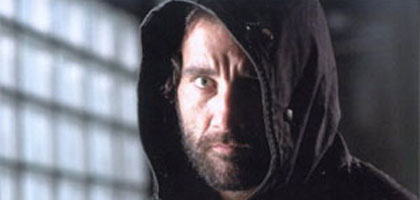
Tough guys don't dream
Film of the Month: I'll Sleep When I'm Dead

Mike Hodges' I'll Sleep When I'm Dead has a hard man out to avenge his brother's death. Its similarity to Get Carter ends there, says Ryan Gilbey.
Watching Mike Hodges' best-known film, the 1971 thriller Get Carter, is one of the most purely miserable experiences in English-language cinema. Although his latest picture I'll Sleep When I'm Dead has a near-identical plot, it offers a partial alternative to Get Carter's dead-end misanthropy. Its emphasis is on emotion rather than action, detail as opposed to incident. And some of that detail is exquisite, from the unusually lived-in sets (bailiffs' letters can be glimpsed in a gangster's grimy flat) to colourful throwaway characters such as the beatnik cabbie who abandons his taxi on a whim or the mobster who issues confusing instructions ("When I say 'left', I mean 'right'"). Hodges and writer Trevor Preston (who has joint possessive credit on the film, as Paul Mayersberg did on the director's 1999 Croupier) get the small things right. Any problems lie with the bigger picture.
Like Michael Caine's Jack Carter, Will Graham is out to avenge the death of his brother - in this case wide-boy Davey, who kills himself after being raped in a dingy London lock-up. Will is played by the charismatic Clive Owen, and it's clear, even from behind his scraggy beard, that he has none of Caine's difficulty expressing vulnerability. When Caine was called on to react to the knowledge that his niece was the star of the skin-flick he had been watching, the result looked more like trapped wind. Owen, on the other hand, renders the breaches of Will's hard-nut exterior as violations no less cataclysmic for being muted. When Will discovers from the coroner that Davey was raped, Owen offers nothing more than a slow parting of the lips and a fleeting thunderclap of incredulity. It's a fine piece of minimalist acting, especially impressive considering the film's pompous insistence, backed up by Simon Fisher Turner's score, that Will is a modern-day samurai or gunslinger who gravitates towards injustice - if not quite the Man with No Name, then the Man with No N.I. Number.
Writer and director have a combined track record in knowing pulp material - Hodges with Get Carter, Pulp (1972) and Croupier, Preston with the ghoulish Slayground (1983) and his work on television's The Sweeney - so it was never likely they would collaborate on a romantic comedy. Some of the noirish touches in I'll Sleep When I'm Dead have a witty tang reminiscent of Stephen Frears' Gumshoe (1971) - that cornball title, for instance, or the opening credits (black lettering caught in a lamplight glare). But the conception of Will is all cliché, with dialogue to match. "I'm always on the move," he snarls, for the benefit of inattentive viewers. "I trust nothing, no one." Even if this kind of speech had not been parodied in Pee-wee's Big Adventure (in which Pee-wee Herman warns: "You don't want to get mixed up with a guy like me. I'm a loner. A rebel"), it would deserve to be mocked, along with those mythic-narcissistic heroes favoured by Michael Mann - including, coincidentally, that other Will Graham in Manhunter. Elsewhere, the portentous dialogue, which might have rung out like urban poetry in a Walter Hill pulp fable such as The Driver (1977) or Streets of Fire (1984), sounds plain clumsy when filtered through Cockney dialects thick as toffee.
Some effort is made to question the macho values of the crime genre, and it is this that best distinguishes I'll Sleep When I'm Dead from other recent British thrillers. Neither Charlotte Rampling nor Sylvia Syms is given much to do, but it's amazing the positive effect their presence has on this very male film: they're like blasts of perfume in an abattoir. Rampling in particular, with her ashen face and disappointed mouth, is well suited to this remorseful genre. Still, it would have been encouraging if the film-makers had found something else for her to do than be held at gun-point.
Of course, the primary violation here is visited on the male body, which makes the movie vaguely revolutionary - even if Preston does seem to have taken whatever research he did on male rape and cut-and-pasted it into the middle of the movie. Two encounters, one with a coroner, the other with a counsellor, play like the Lee J. Cobb scenes from The Three Faces of Eve (1957) or the psychiatrist's speech from the end of Psycho (1960). But the incongruity is strangely pleasing, and not only because fan-boy admirers of Get Carter won't be expecting to hear phrases like "non-consensual buggery" and "forced genital/mouth contact". Hodges' best choices have always been those that shouldn't have worked: casting John Osborne in Get Carter, or camping it up like crazy on Flash Gordon (1980). Halting the narrative for a brief seminar on the psychology of rape falls unexpectedly into that category.
Possibly this is because it's one of the few times when the audience is told something that can be trusted. It's fitting that there are so many driving sequences here, with faces lit up temporarily as they pass beneath streetlamps on a never-ending nocturnal tour of South London; the movie is similarly sparing with its own illumination. We learn virtually nothing about anyone besides the rapist, who proves helpfully articulate when Will confronts him. There was always the slim possibility in Get Carter that the whole film was a noir daydream cooked up by Jack as he read Farewell, My Lovely during the opening credits, and Hodges offers the same loophole in the new picture, which is bookended by shots of Will staring out to sea as he murmurs: "Most thoughts are memories - and memories deceive." It's a definite drawback, though, that the characters remain so opaque it doesn't matter either way whether the film was a dream or not.
Besides, the movie is at its most incisive when it gets down to the nitty-gritty of penetrating the genre's macho blockade. After Davey is raped everyone who had faith in his masculinity and their own feels undermined. Despite not having seen his brother for years, Will is able to claim categorically that Davey wasn't bisexual, even once he learns that he ejaculated during the attack. On hearing about the rape from Will, Davey's friend Mickser splutters: "Davey was... He was not bent! Fuck you!" That choice of profanity is as revealing of the close proximity between sex and violence in male culture as the repeated inserts of the gun that, in an image of Freudian clarity, Mickser stows in his glove compartment.
There is something provocative too in Will's detailed preparations for the murder of Davey's attacker. A personal barber attends to him in his hotel room, while a suit is dispatched to be pressed. In a wave of the barber's smock, Will is suddenly clean-shaven, Brylcreemed, suited and booted. On one level he is equipping himself to deal with his wealthy adversary, confirming the film's class struggle between poor or gaudy gangsters and the upper class with its expensive drug habits and polished wooden floors. But as the camera admires Will's smouldering eyes and the crisp lines of his suit, it's easy to forget that he is going out to kill a man, rather than to have dinner with Richard Gere.
